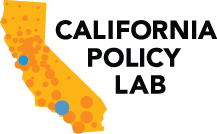- By:
- Category:

Los Angeles – November 15, 2023 – New research released today by the nonpartisan California Policy Lab (CPL) focuses on Time-Limited Housing Subsidy (TLS) programs and the impact these programs have in reducing homelessness. TLS programs provide a subsidy for market-rate rentals for eligible individuals for up to two years, and are also often referred to as Rapid Re-Housing. In a new working paper and policy brief, CPL shows that enrollment in a TLS program reduced subsequent enrollment in homelessness services by 25% among single adults in Los Angeles.
“During the past ten years, Time-Limited Subsidy programs have grown considerably as a strategy to reduce homelessness, but the evidence on their effectiveness has been fairly limited,” explains co-author Dr. Robert Santillano, Senior Researcher at CPL’s UCLA site. “In this work, we are able to track whether program participants subsequently enrolled in homelessness services up to four years after initially experiencing homelessness, and find that TLS reduced future homelessness across each of the four years.”
“With the limited funding available to address our region’s homelessness crisis, we must support programs that we know address the ongoing emergency and improve our system’s impact. This study shows that time-limited subsidies work,” said Dr. Va Lecia Adams Kellum, CEO of the Los Angeles Homeless Services Authority. “I thank California Policy Lab for this incredible analysis and look forward to locking arms with my partners at the city and county to improve upon this successful program.”
Research Background
The research team tracked outcomes for 3,677 adults who were enrolled in TLS in Los Angeles between July 2016 and June 2018, using de-identified administrative data. They followed outcomes (including if people subsequently enrolled in homelessness services program in LA County) for four years after they initially experienced homelessness. The study sample includes all enrollees in the program, not just people who moved in and received the subsidy, which is necessary for the research design and relevant for understanding the effects for all who were enrolled.
Research Findings
Of those who were enrolled in TLS, 62% were able to move into a market-rate rental and received a subsidy to support their rent. The average total amount of subsidy provided was $5,815. In an exploratory analysis, the authors found that these program enrollees (whose rent was subsidized) experienced a 35.4% decrease in future homelessness while those who did not only saw a 6.4% decrease, which was not statistically distinguishable from zero.
Additional Research Findings:
1) Positive benefits exist across racial and ethnic groups. Black, Latinx, and White participants in TLS all experienced statistically significant reductions in homelessness. However, the benefits were largest for Latinx participants (30.6% decrease) and smallest for Black participants (19.1% decrease).
2) TLS helps people with varying levels of risk for future homelessness. TLS programs were originally designed to quickly rehouse people experiencing homelessness due to a financial shock, however, people with varying service histories related to health, mental health and criminal legal involvement, are increasingly enrolled in TLS. The research team stratified people into three groups that corresponded to their risk of experiencing homelessness again in the future. TLS participants from all three groups experienced a 25% reduction in homelessness compared to similar adults, suggesting that TLS can be effective for adults with both low and high risk of future homelessness. However, the reductions in homelessness among low-risk individuals were concentrated in the first two years of enrollment, while the reductions in homelessness for high-risk individuals was sustained in each of the four years.
###
The California Policy Lab generates research insights for government impact. Through hands-on partnerships with government agencies, CPL performs rigorous research across issue silos and builds the data infrastructure necessary to improve programs and policies that millions of Californians rely on every day.
